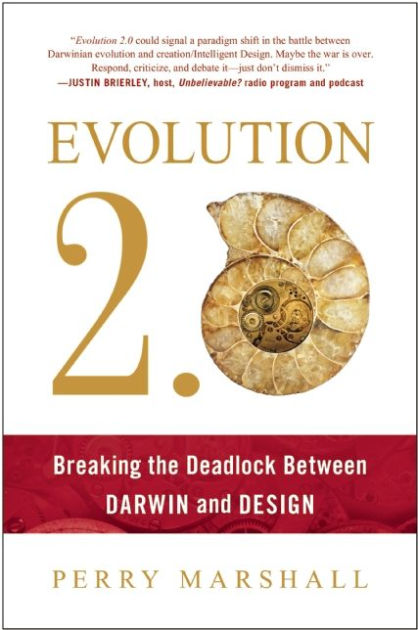|
home | what's new | other sites | contact | about |
||||
|
Word Gems exploring self-realization, sacred personhood, and full humanity
Perry Marshall's an electrical engineer / computer programmer
return to "Evolution" main-page
Editor's note: The following is from Perry Marshall's book, Evolution 2.0: Breaking the Deadlock between Darwin and Design
“At the beginning of this journey, absorbing books and scouring websites, I was gasping for breath in an ocean of confusion and frustration.” Editor’s note: How often I have commented, primarily to myself, in similar vein. It is so difficult to get a straight story from anyone in this field of enquiry – not only misinformation, but disinformation. It is, as we’ve noted earlier, an example of the attorney with the weak case “shouting at the jury.” And what about those 1000 articles in scientific journals which would smash the clay feet of Darwinism? They’re just ignored, cutting-edge research swept under the rug, by the Darwinian monopoly which writes the textbooks. “Biology was such an immensely complex subject, and the debates were so charged with emotion.” Editor’s note: Is this a debate among objective white-coated scientists or a fever-pitched go-to-meeting tent revival? “But the worst part was having no sense of anything solid… I needed something that would make the whole topic less ‘squishy.’ I thought probability and statistics might help, so I started asking questions like, If a hacker has to try 100 billion combinations, on purpose, to guess one eight-digit password, then how long would it take for random copying errors to produce an eye? “An eight digit password with upper- and lower-case letters and numbers has more than 1014 (100 trillion) possible code combinations. The [so-called ‘simple’] bacterium Mycoplasma genitalia, widely studied because it has one of the smallest genomes, has 582,970 base pairs. That makes 1023 (100 billion trillion) possible code combinations. The human genome, with 3 billion base pairs, has 1038 possible code combinations.” Editor’s note: And now we quickly enter the arena of a time requirement of multiple durations of the entire universe to allow any credibility for randomness. Darwinists blithely blather about “given enough time” randomness will make pigs fly. But there’s not enough time in a whole string of universes to make this fairy-tale come true. It's a statistical impossibility. “I soon found lots of people cry foul as soon as you bring up statistics in evolution debates. Some simply refused to entertain such questions at all. Occasionally someone would remark, ‘Obviously we’re here so it doesn’t matter what the chances are.’ Editor’s note: This “obviously we’re here” remark is one more glaring example of “circular reasoning,” which we addressed in an earlier article and in the “Clear Thinking” writing. Let’s understand what's happening with these “people who cry foul.” Those who cannot win an argument on the merits of the case resort to “political correctness,” a form of censorship, an attempt to ridicule and dishonor an opponent rather than meet another viewpoint in open and honest debate. “One would surely expect to find a book somewhere called The Statistical Case for Random Mutations, or something like that, which would methodically demonstrate that an acceptable percentage of beneficial random mutations will inevitably occur. Such a book would be a staple of any evolutionary reading list. After all, one can hardly practice science without math! But alas, I found no such book. The rigorous treatments I did find, such as Fred Hoyle’s Mathematics of Evolution and a symposium at the Wistar Institute showed [that] evolution via random mutations was exponentially improbable.”
|
||||
|
|

